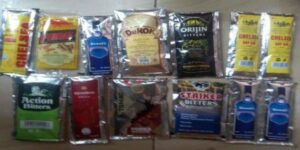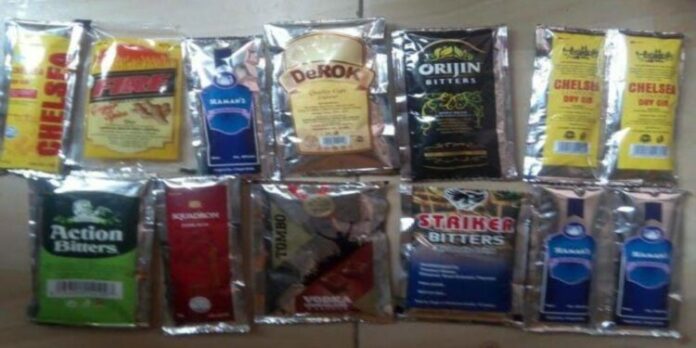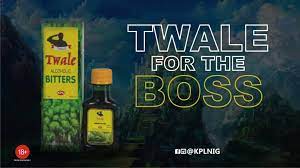
MAN condemns ban on sachets alcohol
The Manufacturers Association of Nigeria (MAN) has expressed concern over the recent ban imposed on spirit drinks in sachets and PET bottles less than 200ml.
According to Segun Ajayi-Kadir, director general at MAN, “Going back in time when NAFDAC first proposed the ban, critical stakeholders including key members of Distillers and Blenders Association of Nigeria (DIBAN) raised concerns in a letter dated 6/11/2018 that included the following:
The assertion that the segmentation or packaging of alcoholic beverages in sachets and PET bottles is responsible for the reported increase of alcohol use among the underage is unfounded.
Rather DIBAN, was of the view that it is a reflection of a systemic problem of much wider ramifications,
That attributing the alleged increase in the use of hard drugs to the production and sales of alcoholic drinks in sachets and small PET bottles is incorrect; (no scientific or other studies have proven this claim.
That packaging and sales of alcoholic beverages in sachets and PET bottles are not the reason for irresponsible use in terms of quantity, intoxication, and other menaces;
This ban will certainly lead to black market or bootlegging, influx and proliferation of fake and adulterated products;
It will also damage local manufacturing and negatively affect the economy, as well as the social wellbeing of the people of Nigeria.”
Ajayi-Kadir further explained that notwithstanding DIBAN’s earlier objections to the immediacy of the ban, the association participated in the preparation of a Memorandum of Understanding (MOU) which was then signed on December 18, 2018, between the Federal Ministry of Health, NAFDAC, CPC (now FCCPC) and Association of Food, Beverages, and Tobacco Employers (AFBTE) and DIBAN.
Besides, he said DIBAN immediately commenced extensive support for the Federal Ministry of Health and NAFDAC to undertake the advocacy, messaging, training, education, and other roles assigned to the committee that was formed.
According to the serial entrepreneur, during this period the association spent over a billion naira as of December 2023 on various campaigns to ensure zero consumption of alcoholic beverages by the underaged and to promote responsible use of alcoholic beverages among adults.
“Our campaigns involved heavy use of radio, billboards, and social media to propagate the Ministry of Health’s carefully crafted messages which were designed to cause a behavioural change in consumers.
“Working with NAFDAC, we targeted young people below the age of 18 years who are not allowed by law to drink alcohol at all, and even the adults who are allowed to drink must drink responsibly. Adverts on radio and television were moved to late hours to prevent young people from being influenced,” he said.
In addition, he said; “In 2021, the ministerial committee set up a technical sub-committee to address gaps that were noticed in its work and to ensure the effectiveness of the committee which meets twice every year.
“The sub-committee made up of experts from the Ministry of Health and other relevant government agencies identified gaps in the MoU and the need for a strategic plan to curb the problem of alcohol use among underage children in the country.”
Moreover, Ajayi-Kadir reiterated that the key challenge the association has had in implementing strategies to eliminate underage drinking in the country is the apparent preoccupation of NAFDAC to ban the production of drinks in sachets and PET bottles by 2024.
“This is at variance with the right of private entrepreneurs to invest and engage in legitimate business.
“Besides, the proposed policy would amount to a deliberate destruction of the business of local and indigenous investors who through thick and thin have kept faith in the Nigerian economy,” he noted.
The director general reiterated that to go ahead with the policy based on perceived danger, without empirical information and not minding the consequences is unfair to the industry operators, the thousands of workers that will lose their jobs, and inimical to the Nigerian economy.
Hence, he urged the government to intensify its activities and support in the form of access control and tighter regulations, but not ban, which would be counterproductive.
He called for the ban to be reversed immediately and replaced with regulations and access control such as the establishment of licensed liquor stores/outlets by Local Government Areas across the country.
And that suspected underage persons (under 18) should be required to show their identification cards to be able to purchase alcoholic beverages as practiced in some other climes.
Besides, he advocated for tightened enforcement by law enforcement agencies and increased monitoring and compliance checks by NAFDAC, FCCPC, and others to ensure strict product quality in terms of content and safety.
Business Day




















